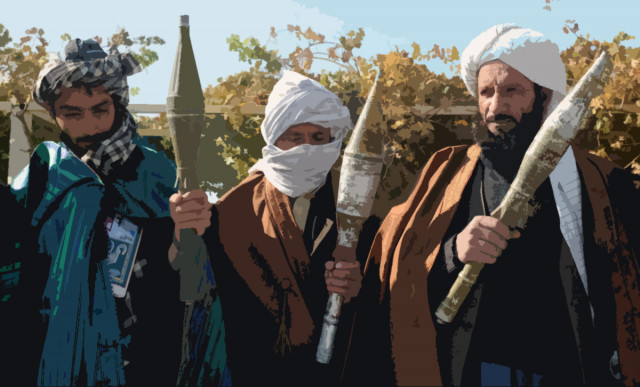IS fears grow in Pakistan and Afghanistan
Pakistani state structures look solid but Afghanistan is fragile and worrisome

Far from the militants’ self-proclaimed ‘caliphate’ in Iraq and Syria, the name of ISIS has cropped up several times in militant circles in recent weeks in Pakistan and Afghanistan. Leaflets calling for support for ISIS, also known as Daesh or by shorter acronym IS, were seen in parts of northwest Pakistan, and at least five commanders of the Tehreek-e-Taliban Pakistan (TTP) and three lesser cadres from the Afghan Taliban have pledged their support.

Pro-ISIS slogans have appeared on walls in several cities in both countries and in Kabul University, where a number of students were arrested. Militant, security and official sources questioned by AFP in recent weeks say these are local, individual initiatives, and at this stage ISIS has not established a presence in the region.
Amid fears of youth joining ISIS, the Pakistan Ulema Council condemned ISIS on Oct 18 and urged youth “in Islamic countries to not cooperate with any violent group whose teachings or actions are against the teachings of Islam.”
Saudi Arabia’s Grand Mufti Sheikh Abdul-Aziz al Sheikh said in August that IS and al Qaeda are ‘enemy number one of Islam’ and not in any way part of the faith.
Earlier this month the National Counter-Terrorism Authority wrote to a dozen government agencies warning them to be on their guard against the group. The letter came as the Pakistan Army fights a major offensive in insurgent bastions of the tribal northwest.
Following the army offensive, called Zarb-e-Azb, the TTP has fragmented into rival factions over recent weeks, fuelling rumours the movement could be overtaken by ISIS.
The TTP says it broadly supports both ISIS militants and al Qaeda, though currently both the TTP and the Afghan Taliban officially recognise only one leader, Mullah Omar, and a senior Afghan cadre told AFP that ISIS was wrong to declare a caliphate.
To spread in the region, ISIS must also eat away at the authority of the state - but, unlike Iraq and Syria, Pakistani state structures look solid and are supported by a powerful army.
Afghanistan, much more fragile, is more worrying - particularly Kunar and Nuristan, mountainous provinces on the Pakistani border, which have long been refuges for militants espoused by IS and al Qaeda.
“People here face problems with the lack of justice, corruption and inefficiency of the state, and therefore they need a counter-narrative, and IS provides one with religious content,” said Pakistan Ulema Council chairman Maulana Tahir Ashrafi.
Published in The Express Tribune, November 3rd, 2014.



















COMMENTS
Comments are moderated and generally will be posted if they are on-topic and not abusive.
For more information, please see our Comments FAQ